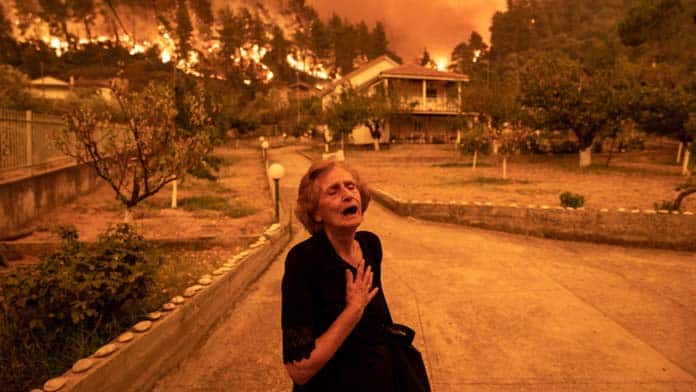Record-breaking floods, fires and heat waves have swept North America, China and Europe. The most recent IPCC report has made it abundantly clear that these disasters are driven by climate change. Globally, July was the hottest month since records began.
In July, around 180 people were killed as catastrophic flooding swept through western Germany and Belgium. After the area received two months’ average rainfall in just two days, the Rhine and Meine rivers burst their banks, destroying thousands of homes and buildings in the German state of North Rhineland-Westphalia and the Belgian city of Liege. Thousands of people are unable to return to their homes due to the damage, whose cost is estimated to run into the billions.
A volunteer helping with the clean up of a school said, “we arrived here with a squeegee and bucket… then you realise you’re ridiculous, because you need a bulldozer.”
Central China has also been hit by unprecedented flooding. In Henan province, record-breaking rainfall in July killed at least 302 people and forced over 200,000 to leave their homes. The provincial capital, Zhengzhou, received the equivalent to its annual average rainfall within three days.
Fires and heatwaves
In July, parts of the US and Canada experienced scorching temperatures of around 48 degrees for two weeks—25 degrees above-average. At least 800 people died during the heatwave, a number that will probably go up.
The atmospheric “heat dome” that caused this has now moved south through the US, causing further damage and deaths.
Meanwhile, Greece has been ravaged by wildfires caused by high temperatures and bone-dry conditions across the Mediterranean. Apocalyptic scenes, reminiscent of Australia’s Black Summer in 2019-20, were broadcast from the island of Evia as people fled the fires by ferry. Nearly 100,000 hectares have burned.
Protesters in Athens called for action on climate change while also blaming the Greek governments’ cuts to fire and emergency services for the extent of the damage.
Algeria has now been hit by similar fires, which the country is struggling to contain.
Scientists say one driver behind these extreme weather events is the shifting pattern of the jet stream, a fast-flowing band of air that governs weather in the northern hemisphere. As it becomes “slower and wobblier” with global warming, extreme events from heatwaves and drought to flooding become more persistent and less predictable. We need to fight for drastic action on climate globally if we are to stop these catastrophic events from becoming the norm.
By Caitlin Doyle






